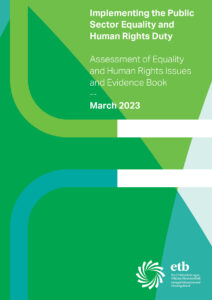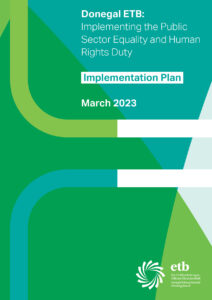
All public bodies in Ireland have a responsibility to promote equality, prevent discrimination and protect the human rights of their employees, customers, service users and everyone affected by their policies and plans. This is a legal obligation, called the Public Sector Equality and Human Rights Duty, and it originated in Section 42 of the Irish Human Rights and Equality Act 2014. But what does this involve? In this blog, Niall Crowley from Values Lab (https://www.values-lab.ie/), who has been supporting Donegal ETB with this work tells us more about it.
Donegal ETB is building on an already strong commitment to equality and human rights, by developing new approaches, based on the Public Sector Equality and Human Rights Duty (the Duty). The Duty presents challenges in its implementation but offers potential for public bodies to be more planned and systematic in their approach to equality and human rights.
 The Duty on public bodies is to have regard to the need to eliminate discrimination, promote equality of opportunity and protect human rights in implementing all their functions. To give effect to the Duty, they must: undertake an assessment of the equality and human rights issues facing the groups identified for the Duty; take immediate and ongoing steps to address these issues; and report annually on progress in implementing the Duty and achievements in addressing the issues. (Section 42, Irish Human Rights and Equality Commission Act 2014).
The Duty on public bodies is to have regard to the need to eliminate discrimination, promote equality of opportunity and protect human rights in implementing all their functions. To give effect to the Duty, they must: undertake an assessment of the equality and human rights issues facing the groups identified for the Duty; take immediate and ongoing steps to address these issues; and report annually on progress in implementing the Duty and achievements in addressing the issues. (Section 42, Irish Human Rights and Equality Commission Act 2014).
Donegal ETB has put in place an implementation plan for the Duty. This was done by a working group involving strong senior management leadership, and supported by Values Lab. In this, Donegal ETB provides a valuable exemplar in leading the way for the wider public sector in Donegal.
involving strong senior management leadership, and supported by Values Lab. In this, Donegal ETB provides a valuable exemplar in leading the way for the wider public sector in Donegal.
A values-led approach is being taken. Values that motivate a concern for equality and human rights, frame the approach to the Duty and provide benchmarks for its implementation. These are the values of: respect, voice, choice, inclusion and participation. Such values, when fully engaged, shape the organisational culture that is central to effective implementation of the Duty.
The working group undertook the first step of the Duty, the assess step, the assessment of equality and human rights issues facing the identified groups and relevant for Donegal ETB’s functions. This was done in an evidence-based manner, through review of existing national and local research and policy strategies. It was participative with the final draft assessment reviewed with civil society organisations representative of the various groups covered.
The plan includes steps by Donegal ETB to enable implementation of the Duty: ensuring leadership for, capacity to, and communication about its implementation. The Duty, in particular the address and report steps, is supposed to be implemented in a way that is integral to how the public body organises its business and decision-making. As such, the plan identifies those key decision-making moments for implementing the address step of the Duty, ensuring adequate and appropriate responses to the equality and human rights issues as assessed.
Donegal ETB has now created the conditions for an effective implementation of the Duty. The next phase is focused on the implementation plan and on realising the potential of the Duty for Donegal ETB learners and staff. A new working group has been formed. Key decision-making moments are being identified, when policies or plans are up for review or are being developed. Senior management leadership remains in place. This is a promising environment to build on progress already made and secure further equality and human rights outcomes in the work of Donegal ETB.
–
For those who wish to learn more, consider completing this Equality and Human Rights in the Public Sector eLearning module (https://www.ihrec.ie/elearning/). It consists of three one-hour units that you can complete in your own time.
